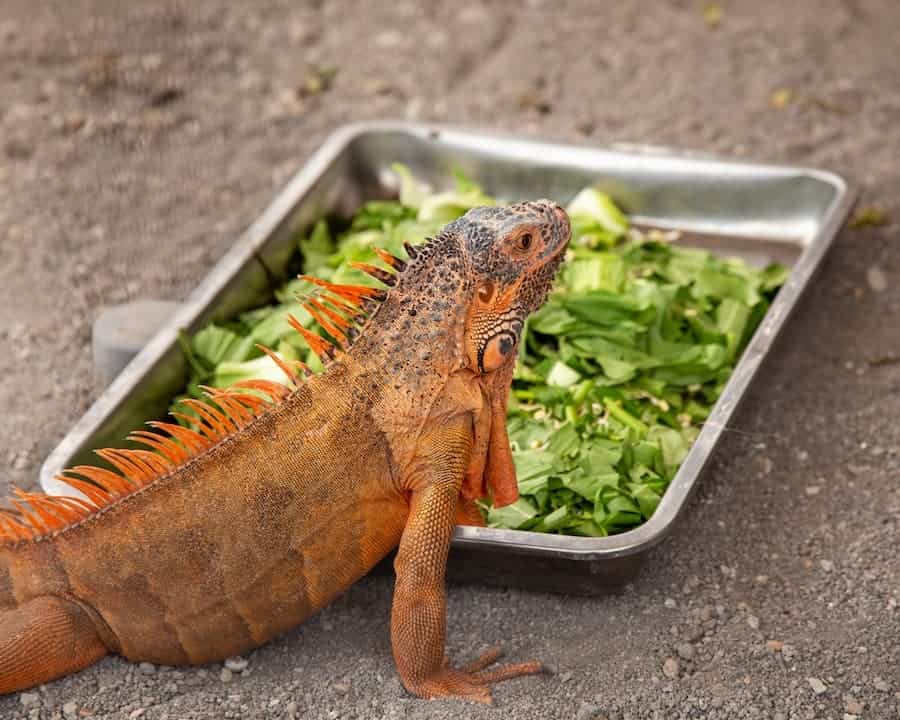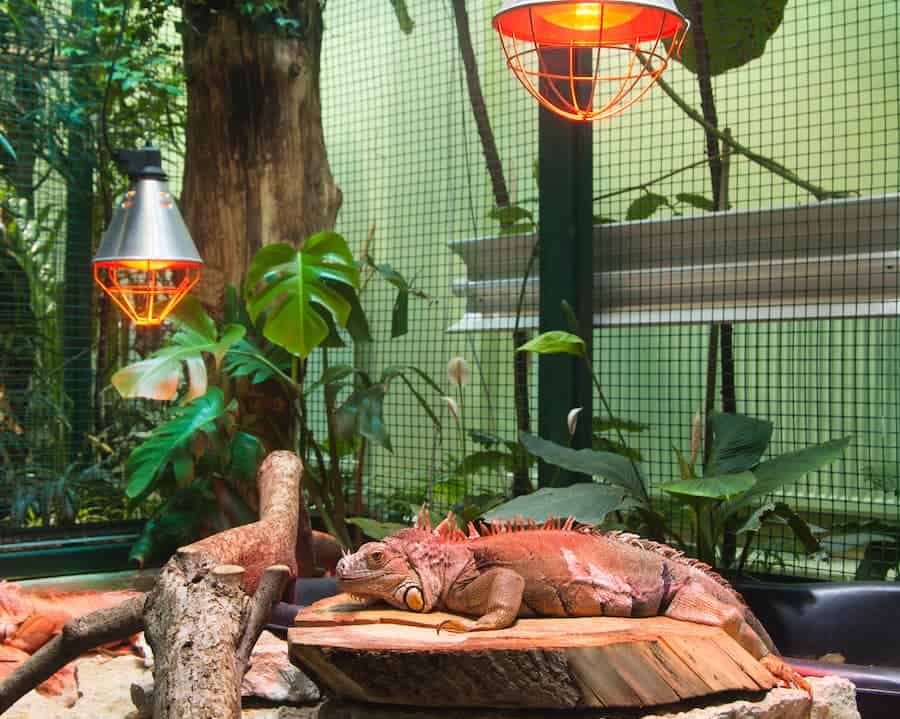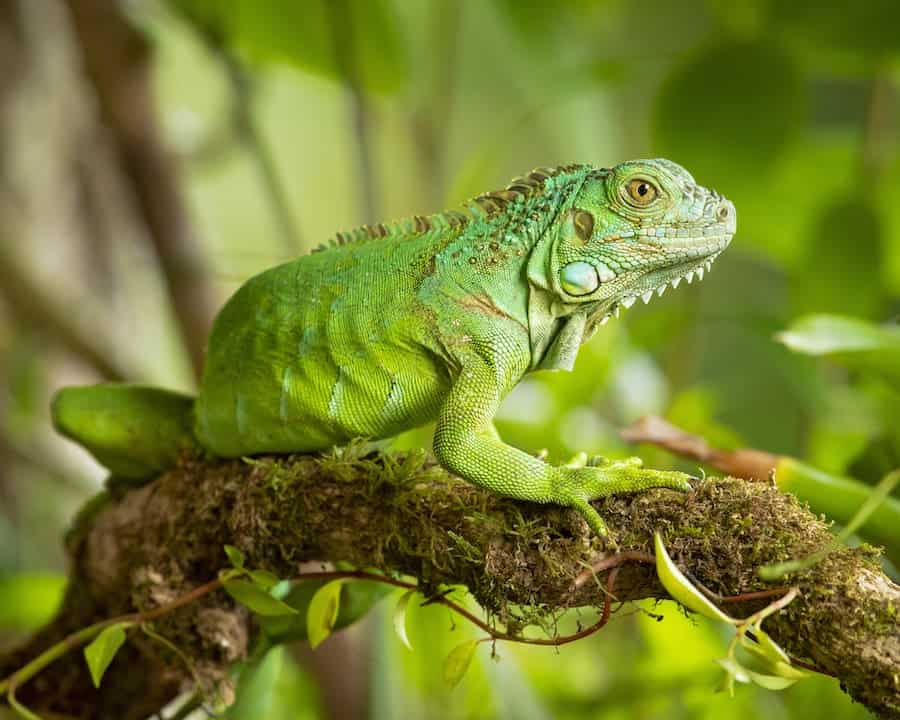Iguanas are fun pets that require a lot of attention and persistence. But if you’re thinking of owning one, you may have heard that they smell. Is this true?
As a general rule, your iguana won’t emit any strange or bad smells. However, rotting food, not bathing the iguana, dirty water, and substrate that has been left in the cage for too long can all contribute to bad odors.
I’ll be covering a lot of reasons why your iguana might smell bad below and how to correct most of these issues.
Iguanas Don’t Smell Bad (When Properly Maintained)

Proper maintenance and care of your iguana will leave you with a clean reptile. Iguanas have a neutral smell when they’re cared for properly, but they will need the occasional bath.
The iguana itself is often not the reason for the bad smell you’re experiencing.
In most cases, there are other reasons why your iguana might smell bad. He is not likely the source of the smell, although he may be the cause of it.
Reasons Why Iguanas Might Smell Bad
So, if iguanas do not smell bad when maintained properly, why are you smelling a strong smell from him?
Here are a few reasons why your reptile may be stinky.
Rotting Food

If you’ve spent a lot of time planning out your iguana’s enclosure, you know that they require a heat lamp. Your iguana will even bask under the lamp throughout the day.
You need a heat lamp to keep your iguana alive, but it may also be the source of the smell you’re experiencing.
Food placed in the enclosure, especially under the heat lamp, will begin to cause some food items to rot faster. Kale may be fine under the lamp for quite some time, but it can hasten fruit spoilage.
One study on the fruit rot process found:
- Lower temperatures slow fruit respiration rates
- Heat hastens respiration rates, causing faster ripening and spoilage
You should go into your iguana’s enclosure daily and remove any food items that he didn’t eat. If he continues not eating the food items you leave out, you may want to consult with your veterinarian.
Are you feeding your iguana properly? If you’re unsure of what your iguana should be eating, read through my guide titled, “What do Iguanas Eat?“
Not Bathing

In the wild, iguanas will bathe in water quite frequently. But these reptiles are at your whim when they live in an enclosure. You need to provide a space for bathing or make it a priority to bathe him.
Bathing and even a gentle massage are good for your iguana.
Daily soaking is good for:
- Moisturizing the iguana’s skin
- Reducing the risk of infection
- Preventing skin cracks or irritation
However, you also need to dump the bath water to make sure that it’s not emitting its own strange smell.
How often should you bathe an iguana?
This is up for debate. Many sources recommend a daily bath of 10 – 30 minutes, but some owners find that a weekly bath is all that their companion needs to stay healthy. You can judge bathing frequency on your own.
Fun fact! Some owners, like this one on Reddit, find that their iguana smells like a cross between popcorn and wet hair when they first come out of a bath.
Don’t worry, though. When your iguana dries, he’ll go back to not smelling.
Most iguanas and reptiles do not smell, unless you forget to clean their cages or do not care for them properly.
Dirty Water

Another reason your iguana or its enclosure may smell bad is because you haven’t changed the water in a while. Iguanas should always have access to fresh water, and that means emptying and cleaning their water bowls daily.
An iguana’s enclosure is hot and humid, which is a recipe for mold and mildew build-up if you’re not cleaning its water bowl every day.
Dirty water can also lead to negative health effects, such as dehydration and not eating properly. I recommend reading my post “Top 15 Reasons Why Your Iguana is Not Eating” to learn the reasons why your iguana may not be eating.
Substrate Left in The Cage for Too Long

If your iguana’s substrate is left in the cage for too long, you will almost certainly create a smelly mess.
In the book “Green Iguana The Ultimate Owner’s Manual,” author and iguana expert James W. Hatfield recommends using folded paper towels taped to newspaper as a substrate.
Paper towels and newspapers do a great job of absorbing liquid. They also allow your iguana to wipe its vents and stay clean after going to the bathroom.
But once your iguana defecates, the substrate should be removed immediately. Don’t wait until later or tomorrow. Remove the substrate now and replace it.
Along with reducing the risk of spreading Salmonella, replacing the substrate will also reduce the risk of unpleasant smells stinking up your house.
It’s important to use the right type of substrate for your iguana. In my post, “Cost of Owning an Iguana in 2023 & How to Save,” I cover the best options for iguana substrates.
Not Scooping Up Poop Daily

Iguana poop is complicated. These lizards defecate and urinate from the same opening and at the same time. Their droppings have both solid and liquid components.
Both should be removed immediately to prevent unwanted smells.
Iguanas are naturally clean creatures, and they do not want to live where they defecate (would you?). Scooping poop daily will prevent bad smells and keep your iguana happy.
Using a cat litter scooper makes it easy to remove poop from your iguana’s enclosure without having to get your hands dirty.
Some owners find that potty training their iguanas makes it easier to prevent unpleasant smells from their feces.
With potty training, you teach your iguana how to use the bathroom in a tub of water. The tub can then be drained and cleaned out quickly and easily.
Regardless of whether your iguana is potty trained, it’s important to make sure that you’re keeping its enclosure free and clear of poop.
Diet and Excess Protein

If your iguana smells bad, it may not be the lizard but his poop that stinks. Poop always stinks, but it can be extra smelly if your iguana eats certain foods.
Protein-rich foods can cause smelly feces. For example, some owners find that when they feed their iguanas black beans, their feces are smellier than usual.
It’s a good idea to keep a logbook of your iguana’s food so that you can track and pinpoint trouble foods.
If your iguana’s poop tends to be really stinky after eating certain foods, try feeding those foods less often or finding a viable replacement with a similar nutritional profile.
Will a Smelly Iguana Stink Up My House?

In short, yes, a smelly iguana will stink up your house. But it’s important to remember that iguanas aren’t naturally smelly creatures.
It’s more likely that you have a stinky enclosure rather than a stinky iguana.
If you’re not cleaning their feces quickly enough or if you’re feeding your pet the wrong types of food, you can quickly find yourself with a very smelly enclosure – and home.
Bad-smelling iguanas are not common. You should work through the tips above to see if any of them are the source of the iguana’s smell. If nothing seems to work and he still smells, it may be time to call a vet.
Your veterinarian will rule out any medical or skin issues that may cause your iguana to smell.

